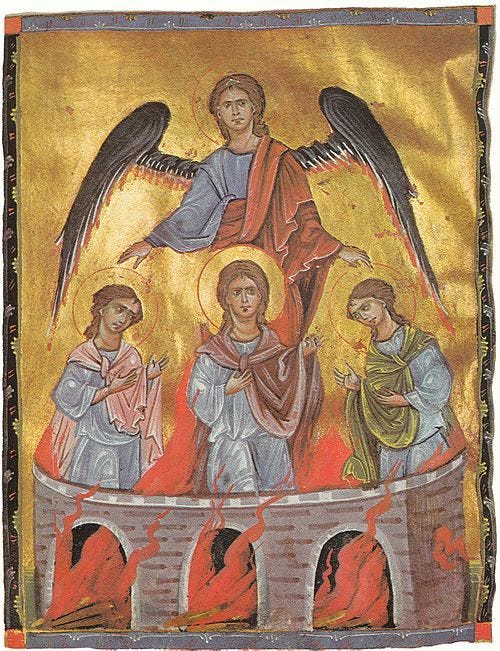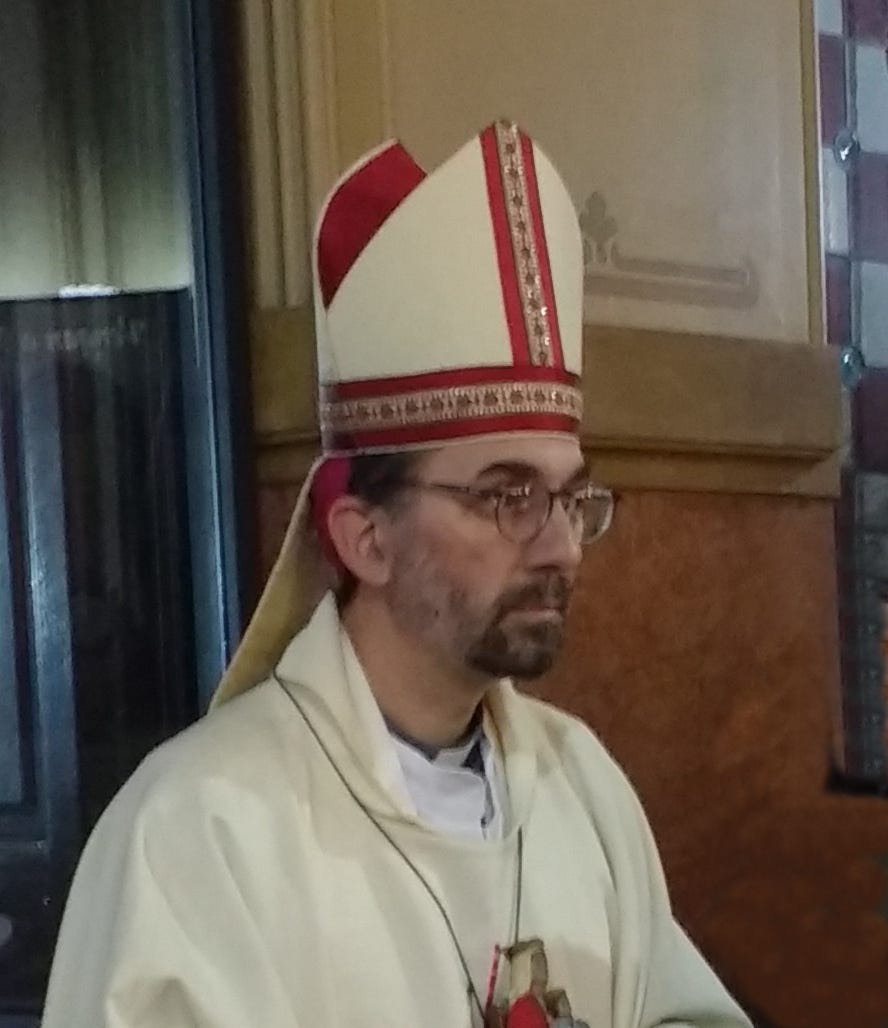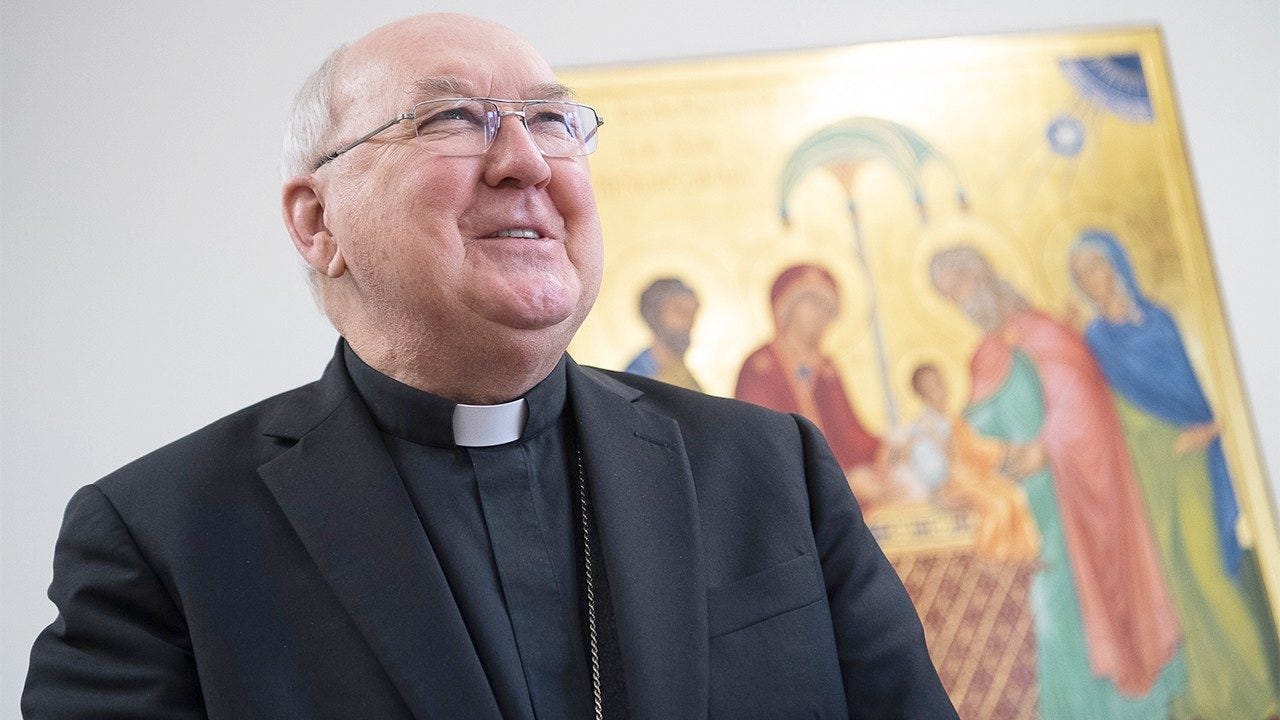Hey everybody,
Today is Tuesday in the third week of Lent, and you’re reading The Tuesday Pillar Post.
If you went to Mass today, or read the readings, you know that today’s Old Testament reading is a prayer of Azariah, also known as Abednego, who along with his friends Shadrach and Meshach was bound by ropes and thrown by King Nebuchadnezzar into a “fiery furnace,” because they refused to bow to an image of the king.
The men survived the fire unscathed. The book of Daniel says that “they walked about in the flames, singing to God and blessing the Lord!” And indeed, Nebuchadnezzar saw in the fire a fourth man, regarded by many Christians as a prophetic prefigurement of Christ the Lord.
The Scripture today includes these words of Azariah:
“For your name's sake, O Lord, do not deliver us up forever,
or make void your covenant.
Do not take away your mercy from us,
for the sake of Abraham, your beloved,
Isaac your servant, and Israel your holy one,
To whom you promised to multiply their offspring
like the stars of heaven,
or the sand on the shore of the sea.”
…
“So let our sacrifice be in your presence today
as we follow you unreservedly;
for those who trust in you cannot be put to shame.
And now we follow you with our whole heart,
we fear you and we pray to you.
Do not let us be put to shame,
but deal with us in your kindness and great mercy.
Deliver us by your wonders,
and bring glory to your name, O Lord.”
I don’t have any especially compelling insight into Azariah’s prayer, but I did learn something interesting yesterday.
At least some scholars think that the “fiery furnace” into which the men were thrown was Baba Gurgur, a naturally occurring crater of flame outside the modern-day Iraqi city of Kirkuk.
There have been fires burning continuously at Baba Gurgur for thousands of years, as natural gas seeps up through cracks in the rocks below ground, which sit above a large oil field.
In some centuries the fires have been larger, in some centuries smaller, depending on the situation of the rock below.

Is it true that this is where Shadrach, Meshach, and Abednego were thrown, after the flames were built up much higher by the king’s men?
I don’t know. It’s possible. And it’s easy to envision the flames being built higher here — 70 feet high, according to the scriptural account of things.
But either way, this place is pretty interesting. Take a look:
And since we’re looking at such things, here’s a cool video shot just 30-some miles away, of fire emerging from a well in Kurdistan:
The more you know, eh?
Anyway, here's the news.
The news
Cardinal Tom Collins, Archbishop of Toronto, is set to see his successor installed later this month, after Collins has been Toronto’s shepherd for 16 years.
The cardinal — a theologian, scripture scholar, and Pillar reader (in a good way) — spent much of his priesthood in seminary formation. And in his retirement, Collins plans to live at Toronto’s seminary, and continue to aid in the formation of young men preparing for priesthood.
As the cardinal prepares for the next phase of his life, he talked with The Pillar in a lengthy, thoughtful interview about his decades of priestly ministry, and the place of God’s Providence in his life.
And - whether you agree with him or not - Cardinal Collins spoke candidly about his view of the challenges facing the Church in Canada, including medically assisted suicide, and the difficulties of a publicly funded Catholic school system.
The cardinal also talked about the spiritual life — and offered some advice for Christians, for priests, and for bishops.
I asked Cardinal Collins what he tells Catholics who struggle with some of the Church’s contemporary theological debates. Here’s what he said:
When I’m meeting with people, I wave my little Bible around, and I say: ‘Read one chapter of the Gospel everyday. The Gospel. Get to know Christ. Read the Gospel.’
We can all go more deeply into the Word of God, the Gospel as written text but also our encounter with Jesus, the Word of God, in the sacraments. A holy hour every day — this isn’t rocket science.
I would suggest to people who are troubled to avoid the heat in favor of the light. Don’t get too absorbed into the rhetoric. Spend an hour in adoration before Our Lord in the Blessed Sacrament every day. Read the Gospels, read the Scripture, be immersed in the words and the lives of the fathers of the Church and the great saints.
On the surface, the sea is rocked by waves of storms and tsunamis, but down deep below there's a peace and a serenity and a reality that we need.
That's why I think now more than ever, we need to go deep in understanding, and deep to the roots of our faith. All the more so because the winds of the zeitgeist are whipping around — sort of the like “winds of lust” at the beginning of Dante’s “Inferno,” just spinning people around in circles.
In that setting we have to go deep.
I regret that I forgot to ask the cardinal what it’s like to go through life with the name of a truly classic cocktail like the Tom Collins. But if you’d like to toast +Tom Collins as he prepares for retirement, here’s the classic recipe for a Tom Collins cocktail.
Best mixed in a pitcher and shared with friends:
2 parts dry gin
1 part lemon juice
½ part simple syrup
Club soda
Stir together gin, lemon juice, simple syrup in a pitcher. Put ice in four glasses. Fill each glass ⅔ full with gin mixture, top with club soda. Garnish with an orange slice and some quality maraschino cherries.
And since I mentioned maraschino cherries, you can also read this classic tale about the maraschino honeybees of Red Hook, Brooklyn.
The final plenary meeting of the German synodal way ended Saturday, with participants voting in favor of resolutions supporting women deacons, a re-examination of priestly celibacy, lay preaching at Masses, and same-sex blessings, among other things.
During the meeting, Luke Coppen reported in detail the decision to back liturgical blessings for same-sex couples, explaining the controversy in the assembly over the proposal, and that the majority of German bishops voted in favor of the idea.
If you want to know how the Germans landed on a bunch of really controversial issues — and read their documents for yourself — well, you should give Luke’s comprehensive summary a read.
Of course after these votes, the question asked in some Church circles is whether the bishops who voted for these matters are in schism. Well, the Holy See hasn’t said as much.
And the devil might well be in details still under study — for example, the document on liturgical blessings for same-sex couples was an exhortation for bishops to permit such blessings. It contravenes recent directives from the DDF on the subject. But has everyone who voted for it committed a canonical act of schism? That’s debatable, because the rules which establish penalties in the Church have to be interpreted strictly. In that vein, some people will argue that calling for the DDF to change its directive — or even for bishops to ignore it — is not the same as actually defying it.
Now, if diocesan bishops actually take up the document and permit such blessings, that would seem a more concrete act which formally repudiates the explicit directives of the pontiff. Since 38 bishops voted in favor of it, that does not seem far-fetched at all. And indeed, it’s apparently happened already in some places, which could prompt a declaration of schism after the requisite canonical warning.
But to date, the pope has not taken that step.
Still, things are pretty serious in Germany, as we’ve been writing now for a couple of years.
And Cardinal Pietro Parolin, Vatican Secretary of State, has signaled this week that the Vatican will eventually have to answer the issue, telling reporters in Rome that “A local, particular church cannot make a decision like that which involves the discipline of the universal Church.”
So, as always with Germany, stay tuned.
The pace of all this unfolding seems often glacial. But so is the scale, scope, and profundity of the problem. And as Cardinal Parolin points out, it’s an issue for the entire Church, not only for Catholics in Germany.
—
Next from The Pillar, an insightful analysis into emerging controversy for the bishops of Portugal.
Here’s the deal. When it was published, an independent report issued last month detailing decades of abuse allegations in Portugal seemed to mark a new era of transparency for the Church in the country, as bishops made pledges to address a harrowing history, and move forward with new safeguards, and measures of safe environment accountability.
But if you ask most observers in Portugal, what’s happened since has been something of a disaster.
A plenary meeting of bishops aimed at dealing with the problem went pretty badly, by most accounts, with the bishops’ conference underemphasizing its plans for reform and accountability, and proving themselves unprepared for media questions about next steps — which gave the appearance of having no plan at all.
As journalist Filipe d’Avillez talked with Catholic professionals across Portugal, he found real frustration with the bishops’ handling of things at the meeting.
And after that meeting, Cardinal Clemente of Lisbon gave comments to the media in which he got hung up on some technical questions about ecclesiastical penalties, and gave the impression that priests accused of abuse will remain in office while they are investigated.
That turned into a media firestorm, and eventually a reprimand of the Church’s bishops from the president of Portugal. And at the same time, the methodology of the independent commission investigating abuse has also come under fire, from victim-survivors of abuse, among others.
All of this has become a mess, in short, with no clear plan for resolution. And how it happened is very much worth reading.
I find most interesting the assessment of a few Portuguese priests who spoke with The Pillar about all of this.
“The big problem with our Church is that it doesn’t know how to communicate. We can make all the right decisions, and have the best of intentions, but we don’t know how to get it across,” explained one priest.
“They had all the time in the world. It is completely inexcusable. I asked if there was a communications plan and they told me to relax because the bishops' conference was handling it. What sort of plan did they have? They had nothing,” said another.
Start your day with Starting Seven - a daily news roundup in your inbox.
—
This is not a papal hot take
Pope Francis yesterday celebrated 10 years in the chair of St. Peter, leading the Church as its visible head on earth as the bishop of Rome.
If you read much Catholic media, you probably saw about a million think pieces written to mark the occasion — it seems that a lot of journalists regard anniversary pieces for the pontiff’s reign as an important part of the job.
We’ve been doing Catholic journalism for quite a while, but we didn’t get that memo, apparently.
And if we had gotten the memo, I’m not sure we would have stepped back from our work to write long reflections on Francis’ decennial. In fact, Ed suggested that I take the occasion of my newsletter to lampoon those papal hot takes, and, if I were Ed, I’d probably do that quite successfully.
But I’m not usually the caliber of sarcasm-artist Ed is, and so I’ll just offer a couple of notes on the papacy of Pope Francis.
These are not comprehensive; much more could be said. But that's the problem with papal hot takes — they don’t leave room for the full analysis their subject really merits. That’s what books are for, written with the clarity of time’s passage.
Still:
—We are obviously living in a complicated papacy which has a very different feel than the ones which preceded it. There’s been no small degree of controversy and disagreement among bishops and other Catholics about the meaning of that papacy, and about the governance of Pope Francis. That won't go away in the near future, even when we enter the era of his succesor.
The Francis papacy has been the occasion in which conflicts that will not quickly resolve have been opened — many of which pertain to the ongoing and unresolved issues surrounding the interpretation of Vatican II.
Part of the reason that's become controversial is that a lot of Catholic bishops, scholars, intellectuals, and journalists believed prior to the Francis papacy that John Paul II and Benedict XVI had definitively and normatively interpreted Vatican II, and did not expect their interpretations to be re-litigated.
— Numerous long-simmering and latent issues in the life of the Church have come to a head during the papacy of Pope Francis — the German synodal way, the Vatican finance scandal, a global sexual abuse crisis, among them. Francis is often assessed or analyzed on his leadership of those issues, and it’s fair to raise questions and concerns about his policy reforms.
Those questions are important. We should tackle questions about governance and its effectiveness.
But a fair evaluation of the problems would also note that whatever can be said about how Francis has handled them, the roots, on several fronts, precede his papacy.
— Despite the profound social impact of the global pandemic, Francis has proceeded very quickly on the implementation of major projects important to him — the global synod on synodality and the norms of Traditionis custodes.
While the pontiff encourages a kind of pastoral gradualism, both of those projects were launched very, very quickly, and have faced real problems with implementation and episcopal support.
On other issues the pontiff’s pace has been decidedly more plodding — among them, the doctrinal issues unfolding in the West, and the full implementation of Vos estis lux mundi or other disciplinary reform efforts.
— Francis has become a kind of divisive litmus test among Catholics in a way that previous popes weren't — at least not to the same degree.
Fawning papal supporters claim the pope has ushered in a new “climate of service and of freedom” and a “conversion of power” in the Church which is expressive of “God’s style” itself. On the other side of the coin, some papal critics can’t seem to go two minutes without decrying the pontiff as the worst pope in history, or with similar invectives.
The loudest voices rarely land in the middle. In fact, I’m inevitably going to get emails in response to this newsletter, half of which will tell me I was too hard on the pope, and half of which will tell me I wasn’t hard enough on the pope.
But here’s what I think is true about many practicing Catholics:
Most practicing Catholics I talk with know the challenges in this papacy, and know that some of them - among them issues pertaining to abuse and misconduct - are quite serious. At the same time, Catholics (myself included) want to love the pope, and want to have a proper filial piety towards him, even if they’re experiencing frustration over elements of the pope’s leadership. This means developing a sense of what it means to be a Catholic, and to have a proper relationship of obedience and respect for the pope, while accepting that the papacy, protected from some kinds of error by the Holy Spirit, is not an expression of episcopal perfection, or anything like it.
But getting all of this right is not always an easy needle to thread, and some Catholics have had real challenges with it.
Ultimately, the pope is not an electoral candidate, and labels like “pro-Francis” or “anti-Francis” are simply unhelpful category errors, in which the language of partisanship and personality politics is imported into the sacramental and spiritual reality of the Church. He’s the pope — being “pro” or “anti” is not really the point, and isn't the way in which most Catholics think through these things. It's the commentary class which can't help but use reductive and simplistic labels like that.
At the same time, the Francis papacy should convey that controversy about how to read Vatican II is not waning as much as had been previously expected. That spells ongoing and significant clashes of worldview in the life of the Church.
And at the same time, the Francis papacy has demonstrated that Vatican I still needs more serious reflection in the Church's life. That its teachings on the papacy, and some of the guardrails articulated in the Second Vatican Council, are still being meted out, in real life, and that'll take a while to resolve.
Also, we are living, as Pope Francis says, in a change of era — in a “hinge moment” in time, in which the communications revolution and the internet, especially social media, have changed the very way that we think. Francis has the misfortune of being the first pope living in this era, even while his advisers seem not really to understand the transformation itself — and who can blame them? Which of us really do?
The challenges of the Francis papacy have been amplified by our epochal change. That’ll be a long-term challenge for the Church, no matter who follows Francis.
— The papacy itself is a gift, a sign of the visible structure God has given us, which gives us assurance of his action in the world through the communion of the Church. That’s a profound grace, and one we ought not lose sight of.
Ok, I hope that wasn’t a papal hot take. Join me in praying for Pope Francis.
And for your listening entertainment, here’s an Italian guitar quartet with a classic piece of music:
Enjoy.
Be assured of our prayers. And please pray for us. We need it.
Also, don’t forget to subscribe! My kids want me to start buying Easter candy, so we need more subscribers!
Yours in Christ,
JD Flynn
editor-in-chief
The Pillar






